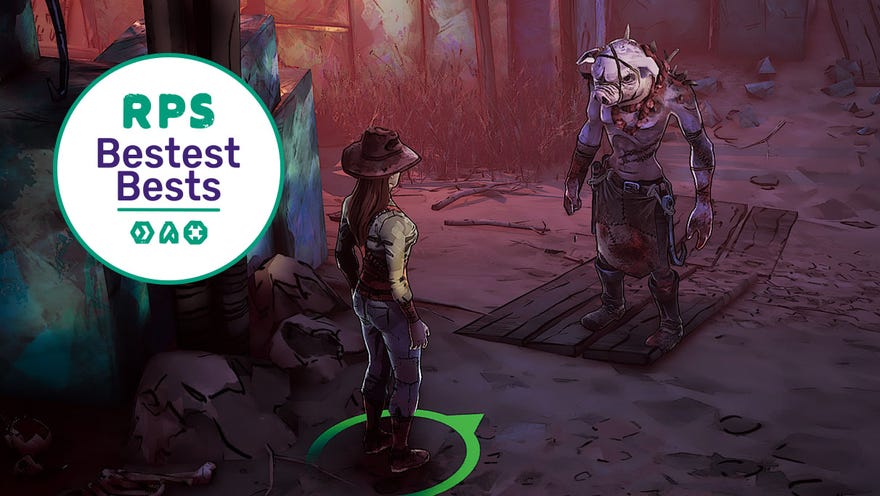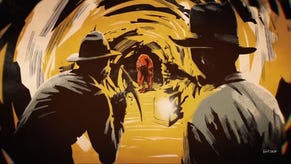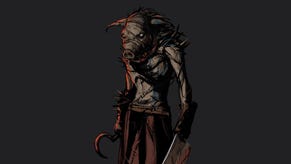Weird West review: a breathtakingly reactive spin on classic Fallout
Dead-and-buried-wood
“Graveyard’s full,” says Timothy Hall, the man prodding the bones of the piano at the saloon in Grackle. It’s a concise expression of everything the town’s been through: the rampaging bandits, the cannibal kidnappings, the swirling tornados. Filling the graveyard has been a solemn bid for order in the wake of so much chaos.
It’s not that way in Bripton, the next town over. The graveyard there is uncannily empty, save for a similarly bare tree. But you can change that, should you so choose: shoot up the bank or fight a duel and, the next time you return to that settlement, new plots will have appeared for every life snuffed out. Weird West even suggests you head to the local cemetery to loot any bodies you’ve missed - though its reputational system implies you should ensure nobody’s watching first.
You could call this the dark fulfillment of Peter Molyneux’s promise of an acorn that, left alone, would grow into a tree in Fable. Or the perfect emblem for Weird West, a game which excels at finding concise expressions of unconstrained player choice. Or you could call it exactly what you’d hope for from a team of key Arkane veterans behind Dishonored and Prey.
It has to be said, though, that Dishonored isn’t the first game that springs to mind when stepping out onto Wolfeye Studios’ warped frontier. Instead, it’s 1997’s Fallout. It’s there in the isometric perspective; in the simple, disposable companions who function primarily as a way to draw fire and expand your inventory space. And it’s there in the cows. Something about bovine NPCs screams Fallout, regardless of their total number of heads.
But most pertinently, the influence is there in the modest maps - the homesteads and cave networks you can see almost from end to end on a single screen - and the abstracted overworld that connects them. During travel across the Weird West, time quickens to a blur, and it’s as the calendar pages flick by that the most far-reaching reactivity occurs. New sheriffs are installed to replace the dead ones. Ghost towns are slowly refilled, either by human beings or something even worse. Nature is healing, or else being paved over.
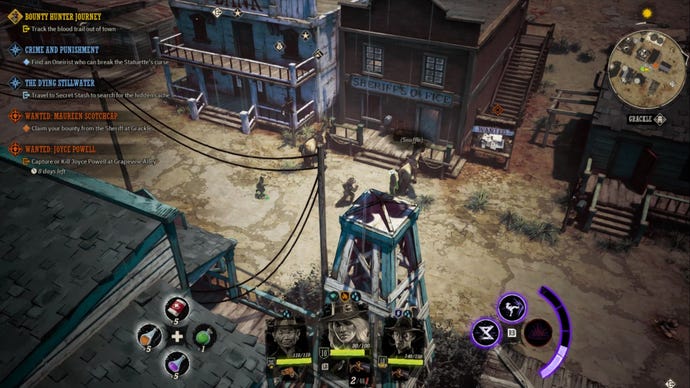
Meanwhile, your past deeds catch up with you. Bandits who once fled your bullets return to stage ambushes, looking to avenge their fallen bosses. Bodies hidden in town are discovered, and locals connect the dots back to you, the stranger passing through. As a result, the same NPCs who happily traded their wares one week might greet you with guns drawn the next. The repercussions of your gunshots echo back and forth across the desert with a convincing crack.
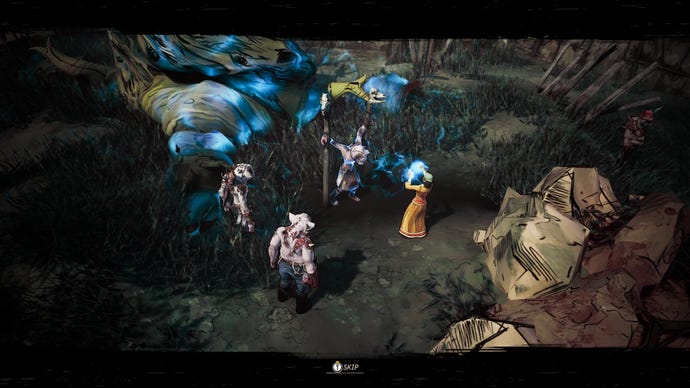
Every so often in Weird West’s story, you’ll shift body to a new character with a different goal and backstory. Starting again - albeit with some permanent perks - is practically akin to waking up on the beach in a survival game. You’ll become accustomed to picking out the basic tools you’ll need, leaning on experience gained in a past life. It’s a system that helps keep the economic game interesting, by emptying your wallet and keeping you desperate. If you hate the idea of that, you can always go and recruit your former self as a companion. Though that idea carries with it the risk of getting them killed, which is emotionally complex to say the least.
While there are similar ideas at work in games like Watch Dogs: Legion, it’s hard to imagine Weird West’s high level consequences landing so well in a continuous open world. Rather it’s the discrete separation of settlements like Grackle and Bripton, with their clearly delineated comings and goings, that enables such meaningful punctuation. Figuring out this societal ecosystem, and how to fool it, is the metagame that’s still got me hooked on Weird West some 20 hours in. Less so the main plot which, while layered with witchy intrigue and unusual twists, typically hinges on a distant objective - forefronting your own self-set adventures.
Thankfully, the low level business of shootin’ (and rootin’, and tootin’) convinces too. Here, the primary touchpoint is Larian’s Divinity RPGs. The West is littered with flimsy receptacles, each spilling over with one volatile liquid or another - oil, rainwater, poison - just waiting to be incorporated into your plans for combat and exploration. Sure, shooting an enemy directly will kick off proceedings, but that’s boring. Better to take aim at a dangling oil lamp, coating the outlaws playing cards below and igniting the candle between them. The more ludicrous the contrivance, the better you tend to be rewarded in terms of damage and job satisfaction as a bounty hunter.
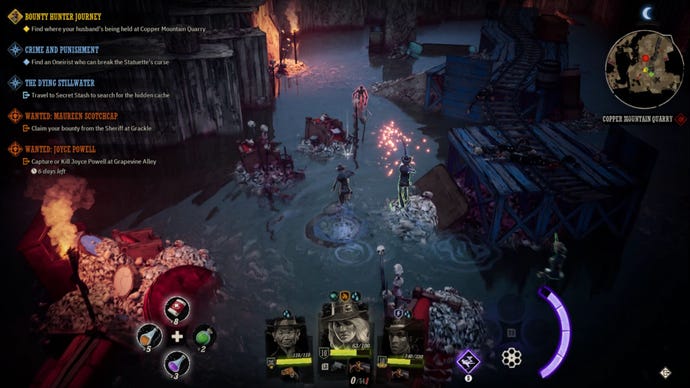
Likewise, breaking into a barricaded shop might earn the ire of the locals. But surreptitiously starting a fire which burns away any locked doors, then returning to poke around once the ash has settled? That works. It’s practically stealth. And all of this intricate interaction is marvellously intuitive. If there’s a criticism to be made, it’s that throwing lamps, barrels and other found objects takes some getting used to without an idea of their expected trajectory; any inherent human understanding of how momentum and gravity interact vanishes with the isometric perspective. Setting fire to your own feet is part of the learning process.
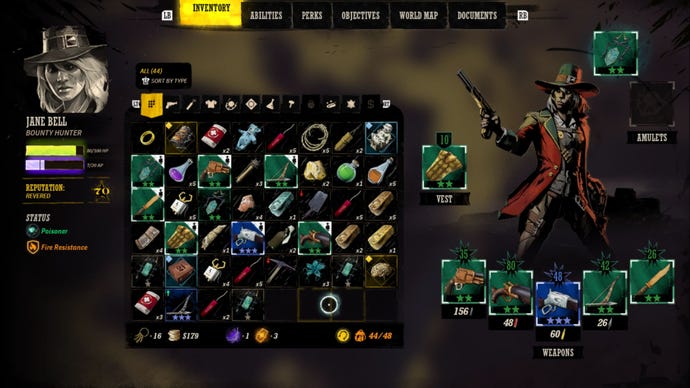
Where Weird West breaks away from its RPG forebears is in its rejection of turn-based fighting. Instead, it controls like a twin-stick shooter, asking you to aim and react under pressure. That might be a dealbreaker for some genre fans, but the messiness of open combat is balanced by three things: the ability to gather an AI posse about yourself, a hefty kick for knockbacks, and a Max Payne-ish dive that stretches out the seconds, giving you extra time to swing your shotgun in the right direction.
Besides, there’s plenty of pondering time to be gained by observing your quarry from the periphery. What initially appears to be a simple stealth system balloons in depth as you discover that enemies have long and meandering patrol paths - and that bringing a bounty target back alive requires a Hitman-esque separation of the prey from their bodyguards. I advise finding an opportunity to trail a lasso down a chimney and silently slide down the rope, like Killer Claus. Unlike Arkane’s Deathloop, which exemplifies the “roll with it” version of the immersive sim fantasy, Weird West encourages you to quicksave and reload often to make your middlingly-laid plans happen.
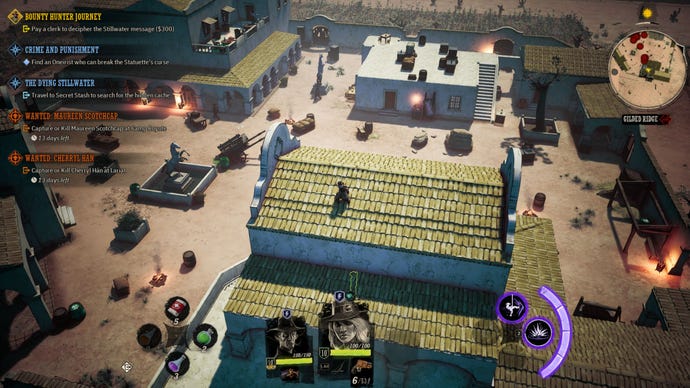
To date, my proudest achievement is the premeditated murder of one Mayor Weeks, a man with personal and professional secrets so vile that I sought him out long after our main quest business was concluded - returning to his plantation to scale the back wall and line up the perfect sniper shot on the veranda where, I knew, he liked to emerge to take the evening air.
The deed done, I was away into the night before his guards located the source of the single silenced bullet. Only once the Mayor was buried, and I miles away, did I take the reputational hit for felling a public figure. Worth it. Graveyard’s full, and nature is healing.
